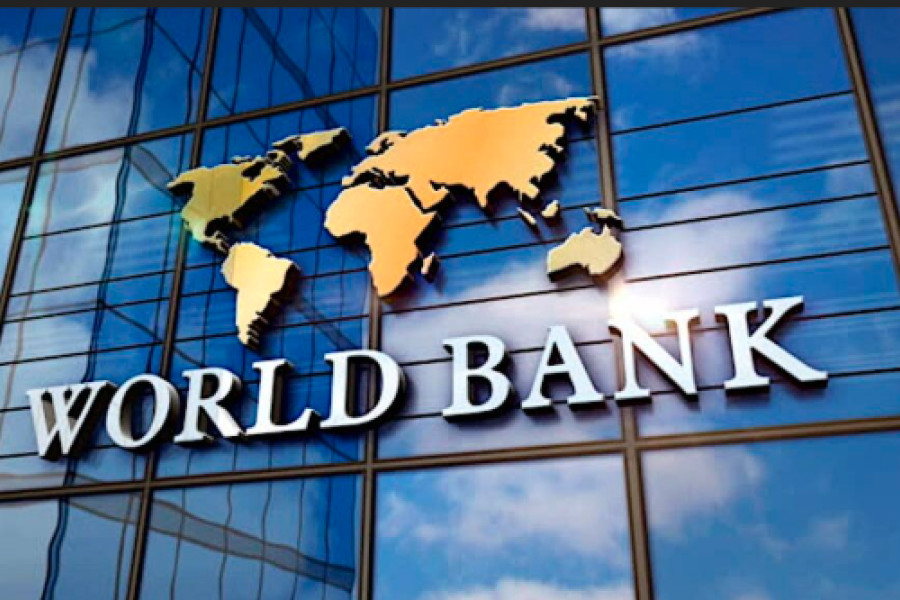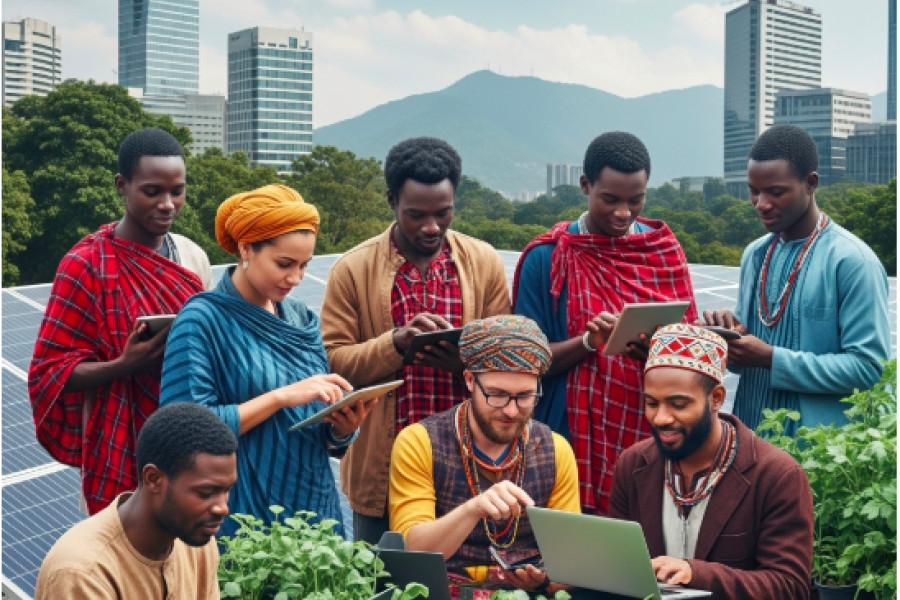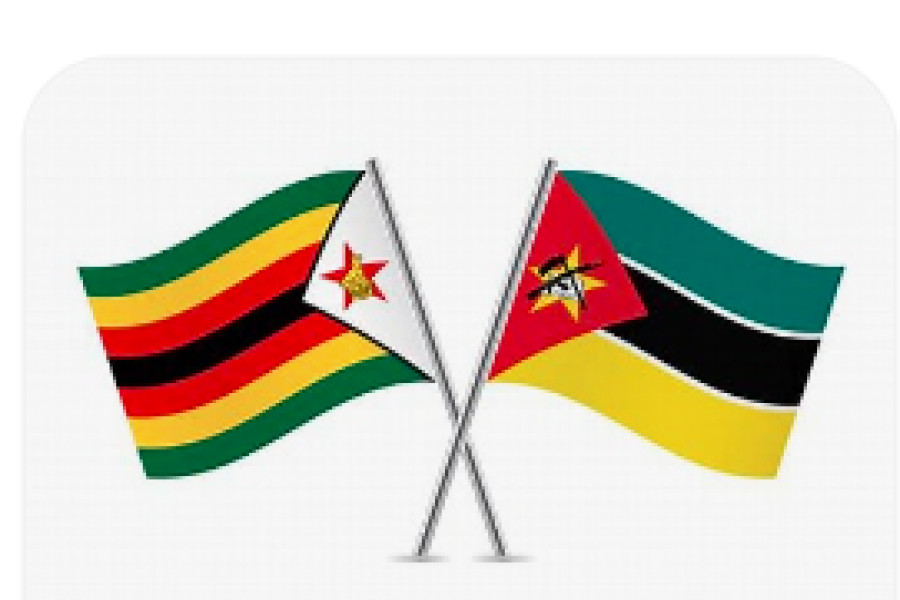
The World Bank at 80: An Afrocentric Critique of Poverty Alleviation Efforts
The World Bank, a product of the post-World War II order, celebrates its 80th anniversary amid growing scrutiny of its role and impact, particularly in the Global South. While the Bank proclaims its mission to create a world free of poverty on a liveable planet, its policy prescriptions and the influence of the Global North have come under increasing criticism, especially from an Afrocentric perspective. This article examines the World Bank's 80-year journey through an African lens, analysing its poverty alleviation efforts, highlighting the concerns raised by Global Action for Africa's Development (GLAFAD), and exploring alternative paths for development in Africa.
A History of Shifting Priorities and Northern Influence
From its inception, the World Bank's leadership, governance, and priorities have been shaped by the United States and its European allies. Initially focused on infrastructure development, the Bank's role evolved over the decades to encompass development policy, extreme poverty eradication, and more recently, climate and job creation. While early infrastructure investments showed promise in fostering national industrialization, the ascent of neoliberal economics in the Global North led the Bank to increasingly favor market-based solutions and private capital.
This bias deepened with the 2015 "billions to trillions" agenda, which prioritized public finance as a tool to attract large-scale private investment. However, economic history suggests that private finance often leads to extraction rather than transformation, shifting risk onto Global South countries. Decades of Bank-supported deregulation, privatization, and a focus on primary commodity exports have left African nations vulnerable to economic shocks and market volatility. The World Bank has a long history of supporting development across Africa, and its efforts have led to significant successes in various sectors. In line with its mandate to reduce poverty and promote sustainable development, the Bank has financed projects that have improved infrastructure, enhanced access to essential services, and boosted economic growth. For instance, the Tanzania Rural Electrification Expansion Program (TREEP) has significantly increased access to electricity, benefiting over 4.5 million people by adding new connections to homes and critical facilities like healthcare centers and schools, thereby creating new employment and business opportunities.
Another area where the World Bank has made a substantial impact is in digital transformation. Recognizing the potential of technology to drive development, the Bank has supported initiatives to expand broadband access and promote digital inclusion. The West Africa Regional Communications Infrastructure Program (WARCIP) in Mauritania, for example, has been instrumental in extending connectivity to underserved areas. By supporting the deployment of fiber optic cables, WARCIP has helped to dramatically increase broadband penetration and reduce the cost of communication services, fostering economic growth and social development.
The World Bank's focus on human capital development is also evident in its support for projects aimed at improving health, education, and social safety nets. In South Sudan, the Safety Net Project provided temporary income opportunities through cash transfers to nearly half a million people, with a significant emphasis on supporting women. This project not only helped to alleviate poverty but also strengthened local capacity in a fragile context marked by violence and displacement. These are just a few examples of how the World Bank's work in Africa is yielding positive results and contributing to the continent's progress.
Our Critique: A Missed Mission in Africa
GLAFAD argues that the World Bank has failed to achieve its poverty alleviation goals in Africa. GLAFAD emphasizes the need for development initiatives to align with the priorities of countries in the Global South. The World Bank's policy prescriptions, often mirrored by the International Monetary Fund (IMF), are seen as restructuring African economies in ways that undermine domestic markets and discourage industrial policy. Examples of World Bank projects in Africa from that have faced criticism regarding their impact on poverty alleviation are provided below. These examples illustrate the concerns raised by GLAFAD and other critics regarding the World Bank's approach to poverty alleviation in Africa. They suggest that some Bank projects, due to their design, conditions, or negative externalities, may not effectively contribute to poverty reduction and, in some cases, could potentially worsen the situation for vulnerable populations.
The Resilient Natural Resource Management for Tourism and Growth (REGROW) Project in Tanzania (Approved 2017, Terminated 2025). This $150 million project aimed to develop protected areas to boost tourism. However, it faced severe criticism and was eventually terminated due to widespread allegations of forced evictions, rapes, and extrajudicial killings linked to the project by Tanzanian park rangers against local communities. Critics argued that the project came at an "enormous cost to local indigenous communities" and that the World Bank did not adequately enforce its own safeguards, thus potentially worsening the vulnerability and poverty of these communities rather than alleviating it.
Support for Structural Adjustment Policies (Ongoing), while not a specific project, it's continued emphasis on structural adjustment policies, including deregulation, privatization, and a focus on primary commodity exports, has been a long-standing concern. Critics argue that these policies, often implemented as conditions for loans, can lead to increased economic vulnerability, job losses in certain sectors, and reduced public spending on essential services like health and education, potentially hindering poverty alleviation efforts and even exacerbating poverty in the long run. For example, UNICEF in the late 1980s already reported that World Bank structural adjustment programs were linked to "reduced health, nutritional and educational levels for tens of millions of children in Asia, Latin America, and Africa." These criticisms persist with contemporary structural adjustment programs.
The Eskom Just Energy Transition Project in South Africa (Approved 2022). This $497 million project finances the decommissioning of a coal-fired power plant and its repurposing with renewable technologies. While framed as a "just transition," critics argue that the project conditions, which include separating Eskom's activities and de-risking private sector participation in electricity provision, could lead to further privatization of the energy sector. Concerns have been raised that this approach might not prioritize the energy needs of the poor and could potentially increase energy costs, thus negatively impacting poverty alleviation. Civil society organizations have labeled the Bank's private sector-led approach as a "flawed development paradigm."
Large-Scale Infrastructure Projects with Social and Environmental Impacts (Ongoing): While the initial focus of the World Bank on infrastructure was seen as beneficial, some more recent large-scale projects continue to draw criticism for their social and environmental consequences, which can indirectly hinder poverty alleviation. For instance, while not named in the provided text, various dam projects and large agricultural schemes across Africa funded or supported by the World Bank have faced opposition due to issues like displacement of communities, loss of livelihoods, and environmental degradation. These negative impacts can push communities further into poverty, offsetting any potential benefits from the project. The focus on large-scale projects to attract private investment, as highlighted in the "billions to trillions" agenda, is seen by some as prioritizing profit over the well-being of local populations.
The Social and Environmental Costs of Development.
From an Afrocentric perspective, the social and environmental costs associated with certain World Bank-backed development initiatives in Africa are deeply concerning and often reflect a disregard for indigenous knowledge, community well-being, and the long-term sustainability of African ecosystems. Critics argue that the Bank's historical emphasis on large-scale infrastructure and resource extraction, often driven by the needs of global markets and the "billions to trillions" agenda of attracting private capital, has frequently led to the displacement of communities from their ancestral lands, the disruption of traditional livelihoods, and the degradation of vital natural resources. These projects, while ostensibly aimed at economic growth, can erode social cohesion, undermine food security, and exacerbate existing inequalities, pushing marginalized populations further into poverty and vulnerability. The focus on Western models of development often overlooks the intrinsic value of African ecological systems and the profound cultural and spiritual connections that communities have with their environment.
Furthermore, an Afrocentric critique highlights the power dynamics inherent in the development process. Decisions regarding project design and implementation are often made with limited genuine participation from affected communities, reflecting a top-down approach that fails to incorporate local perspectives and traditional environmental management practices. The environmental and social safeguards, while present in the World Bank's policies, are often inadequately enforced or circumvented, leading to irreversible damage and leaving African communities to bear the brunt of negative consequences. The prioritization of economic indicators over holistic well-being and ecological integrity perpetuates a cycle where development becomes synonymous with dispossession and environmental degradation, ultimately undermining the very foundations of sustainable poverty alleviation from an African standpoint.
How the World Bank can play big brother to other development banks
The emergence of the New Development Bank (NDB) and the Asian Infrastructure Investment Bank (AIIB) signifies a notable diversification of the global financial architecture, presenting alternative avenues for development finance beyond the traditional dominance of the World Bank and the IMF. The NDB's explicit focus on infrastructure and sustainable development in emerging economies, coupled with its stated ambition to de-dollarize lending, underscores a strategic divergence in priorities and operational modalities.
Within Africa, a well-established landscape of multilateral development banks (MDBs) – including the African Development Bank (AfDB), the Development Bank of Southern Africa (DBSA), the East African Development Bank (EADB), the Central African States Development Bank (BDEAC), and the West African Development Bank (BOAD) – already plays a critical role in addressing the continent's multifaceted development challenges. These institutions possess deep regional expertise and established networks, enabling them to tailor interventions to specific local contexts.
Rather than viewing these alternative and regional MDBs solely as competitors to the World Bank, a more productive lens for analysis lies in exploring the potential for strategic collaboration to enhance their collective impact on African development. The World Bank, leveraging its extensive experience and global reach, could significantly amplify the effectiveness of African MDBs through several key avenues:
- Harmonization for Enhanced Co-financing: Divergent standards and procedures often impede efficient co-financing arrangements. The World Bank could spearhead efforts to harmonize operational frameworks, procurement guidelines, and environmental and social safeguards. This would streamline joint project financing, reduce transaction costs, and unlock greater financial flows for critical development initiatives.
- Knowledge Transfer and Best Practices: The World Bank's vast repository of knowledge and experience in project design, implementation, and evaluation represents a valuable resource. Proactive sharing of best practices, particularly in areas such as project management, risk assessment, and impact measurement, could significantly bolster the operational efficiency and development outcomes of African MDBs.
- Technical Assistance and Capacity Building: Many African MDBs could benefit from targeted technical assistance in specialized areas such as innovative financing instruments, climate finance mobilization, and debt management strategies. The World Bank could provide tailored capacity-building programs to strengthen the technical expertise within these regional institutions.
- Strategic Co-financing and Complementarity: Instead of viewing projects as a zero-sum game, the World Bank could actively seek opportunities for co-financing projects with African MDBs where their respective strengths are complementary. This could involve the World Bank providing larger-scale financing or specialized expertise, while regional banks offer local knowledge and contextual understanding.
- Facilitating Access to International Capital Markets: The World Bank's strong credit rating and established relationships with international investors could be leveraged to support African MDBs in accessing global capital markets on more favorable terms, thereby expanding their financing capacity.
- Advocacy and Policy Dialogue: The World Bank can play a crucial advocacy role in highlighting the importance of strengthening African MDBs and fostering a more enabling policy environment for their operations at a global level. Joint policy dialogues could also address systemic challenges hindering development finance in Africa.
- Joint Development of Innovative Financing Instruments: Collaboration could foster the creation of innovative financing instruments tailored to the specific needs of African countries, such as blended finance mechanisms, green bonds, and infrastructure-backed securities.
The structure of the World Bank, particularly its voting system, reveals a fundamental imbalance of power that necessitates systemic change. Voting power is primarily determined by each member country's financial contributions, which heavily favors developed nations. As a result, African countries, despite comprising a significant portion of the Bank's client base and being disproportionately affected by its policies, possess minimal influence in shaping the institution's agenda and priorities. This disparity is evident in the allocation of Executive Directors and the overall distribution of votes, where the United States and other wealthy nations wield a level of control that far outweighs that of the entire African continent. This skewed representation undermines the principles of ownership and accountability, as African nations are often compelled to accept development strategies that do not adequately reflect their unique needs and contexts.
This inherent power imbalance has led to criticisms that the World Bank's development model is often imposed rather than collaboratively developed. The conditions attached to loans, for instance, frequently reflect the economic ideologies of the Bank's dominant shareholders, potentially neglecting crucial social and environmental considerations within African countries. Furthermore, the focus on large-scale projects, driven by the need to attract international capital, can override local priorities and knowledge, leading to unintended negative consequences that exacerbate poverty and inequality. For the World Bank to truly serve its mandate of poverty alleviation and sustainable development, a fundamental restructuring of its governance is essential. This reform must ensure equitable representation and decision-making power for African nations, enabling them to play a more active role in shaping development policies that directly impact their futures. More specifically the World Bank as it engages with Africa should
1. Prioritize African Ownership and Participation:
· Shift from Imposed Policies: Move away from standardized policy prescriptions (like structural adjustment) and embrace development strategies that genuinely reflect the priorities of African countries.
· Enhance Participatory Processes: Ensure that African governments, civil society organizations, and local communities are central to the design, implementation, and evaluation of World Bank-funded projects. This includes:
o Mandatory and meaningful consultations at all stages of the project cycle.
o Incorporating local knowledge, traditions, and practices into project design.
o Strengthening the capacity of African institutions to lead their own development agendas.
2. Foster Economic Transformation and Diversification:
· Support Industrialization: Provide financing and technical assistance to help African countries develop diversified economies, reduce reliance on primary commodity exports, and create decent jobs.
· Invest in Key Sectors: Prioritize investments in manufacturing, infrastructure (including sustainable energy), technology, and value-added agriculture.
· Promote Regional Integration: Support initiatives that enhance regional trade, cooperation, and infrastructure development to create larger markets and boost economic growth.
3. Strengthen Social and Environmental Safeguards:
· Enforce Safeguard Policies: Rigorously enforce environmental and social safeguard policies to prevent projects from harming local communities and ecosystems.
· Conduct Thorough Assessments: Conduct comprehensive environmental and social impact assessments before project approval, with independent oversight.
· Ensure Accountability: Establish robust monitoring and accountability mechanisms to track social and environmental outcomes and address grievances effectively.
· Protect Land Rights: Recognize and protect customary land rights, and ensure that communities are not displaced or dispossessed as a result of World Bank-funded projects.
4. Reform Governance for Equitable Representation:
· Restructure Voting Power: Reform the World Bank's voting system to reduce the influence of wealthy nations and give African countries a greater voice in decision-making.
· Increase African Representation: Increase the number of African Executive Directors and senior staff within the World Bank.
· Promote Transparency and Accountability: Enhance transparency in the Bank's operations, including the disclosure of project information, loan terms, and policy decisions.
5. Enhance Collaboration and Partnerships:
· Strengthen Collaboration with African Institutions: Work more closely with the African Union, regional economic communities, and African development banks (like the AfDB) to align development strategies and leverage resources.
· Support South-South Cooperation: Facilitate and support collaboration among African countries and other nations in the Global South to share knowledge, expertise, and best practices.
· Engage with Civil Society: Foster stronger relationships with African civil society organizations to ensure that development policies and projects are responsive to the needs of the people.
Conclusion
By implementing these recommendations, the World Bank can move towards a more equitable and effective partnership with Africa, contributing to sustainable development and genuine poverty alleviation. As the World Bank marks its 80th year, it faces a critical juncture. To remain relevant and effective in Africa, the Bank must move beyond its private capital focus and embrace a development model that prioritizes the needs and aspirations of African nations. This requires a shift towards economic transformation and industrial policies that empower states, reduce dependence on external forces, and safeguard human rights. The future of development in Africa hinges on amplifying the voices of Global South countries, social movements, and civil society to reshape the conversation and chart a new course toward sustainable and equitable progress. The World Bank must adapt, or risk becoming an obsolete relic of a bygone era.
Related Stories

The Future of Sustainable Development in an Artificial Intelligence Era: Africa’s Path Forward

A Shared Harvest: How Cross-Border Agriculture Can Lift Zimbabwe and Mozambique Out of Poverty